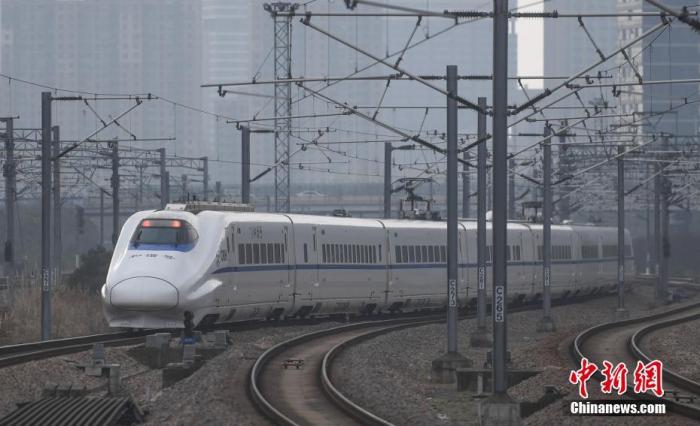(Observation of the Two Sessions) The development of world-class urban agglomerations: how to promote integration in the Yangtze River Delta
China News Service, Beijing, March 7th, title: The development of world-class urban agglomerations: how to promote the integration of the Yangtze River Delta?
China News Agency reporter Zhao Yejiao Fang Kun
The Yangtze River Delta region has created a quarter of China’s economic output with 4% of the country’s land area. It is one of the most active, open and innovative regions in China’s economy. It is entrusted to "the sixth largest in the rising world." "City agglomeration" has high hopes.
Aerial photography of Qingpu New Town.
Photo by China News Agency reporter Yin Liqin
In 2019, the Chinese government upgraded the regional integrated development of the Yangtze River Delta to a national strategy and compiled and implemented the "Outline of the Yangtze River Delta Regional Integrated Development Plan."
In recent years, the government work report has focused more on regional coordinated development. The "Yangtze River Delta" has always been a hot word. This year, the government work report has once again proposed to firmly promote the integrated development of the Yangtze River Delta.
Under the focus, how can the three provinces, one city and 27 cities in the region further promote integration?
What problems are encountered in the development of world-class urban agglomerations?
What barriers still need to be broken?
According to Xu Yuning, deputy to the National People's Congress and chairman of the Ningbo Municipal Political Consultative Conference, the integration of the Yangtze River Delta requires transportation integration first. Only when transportation is "directly connected and directly connected" can there be sufficient flow of people, logistics, capital, and information between cities.
On January 28, in Hangzhou, Zhejiang, a high-speed train departed from Hangzhou East Railway Station.
Photo by China News Agency reporter Wang Gang
“Take Ningbo as an example. Nanjing Metropolitan Area, Hangzhou Metropolitan Area, Hefei Metropolitan Area, Suzhou, Wuxi and Changzhou Metropolitan Area have all achieved direct connection with Shanghai, but Ningbo Metropolitan Area to Shanghai still needs to detour." Xu Yuning said, Shanghai and Ningbo are separated from each other. It is very close and far apart, over one hour in the metropolitan area. It is recommended to accelerate the planning and construction of the Shanghai-Ningbo direct highway and railway corridor.
Chen Naike, deputy to the National People's Congress, member of the Standing Committee of the Chinese Federation of Returned Overseas Chinese, and vice chairman of the Zhejiang Provincial Federation of Returned Overseas Chinese, believes that there are also shortcomings in the development of the integration of infrastructure and public services.
"For more than a year, Shanghai, Jiangsu, Zhejiang and Anhui have focused on increasing the supply of high-quality public services, expanding the scope of allocation, and promoting the benefits of integration through the development of equalization of public services, but there are still problems that urgently need to be promoted at the top level."
Chen Naike said that the current integration of the Yangtze River Delta has problems such as relatively lagging behind the construction of a basic public service standard system, and a large gap between collaborative innovation services and planning goals.
He suggested that "standardization +" be the main starting point for the integration of public services to achieve regional mutual recognition and docking.
Sort out the list of basic public services, simplify and unify the existing basic service standards, connect and recognize each other, and include and expand the scope of application of standardization.
Zhang Tianren, deputy to the National People’s Congress, executive member of the All-China Federation of Industry and Commerce, and chairman of Zhejiang Tianneng Group, believes that in the integration process of the Yangtze River Delta, breaking down invisible administrative barriers and benefit sharing will be the next step to promote the Yangtze River Delta. An important exploration of the formation of chemical reactions between.
Among the successful cases of the five major international city clusters, there is a situation of inter-state and inter-provincial industrial cooperation. Therefore, Zhang Tianren suggested to increase support and cultivation of the intelligent logistics equipment industry cluster in the Yangtze River Delta, promote its development of inter-provincial industry cultivation, and continuously enhance advanced manufacturing. The international competitiveness of industrial clusters is also conducive to in-depth exploration of the integration strategy of the Yangtze River Delta.
From the perspective of the development process of world cities, the development of world-class urban agglomerations will experience four stages: embryonic development period, rapid development period, maturity period, and mature development period.
To "advance" the rapidly developing Yangtze River Delta region, it still needs to shorten regional distances, break through administrative barriers, and establish industrial clusters. In particular, the three provinces and one city need to establish an international perspective, pay attention to economic density, and further enhance competitiveness.
(Finish)

